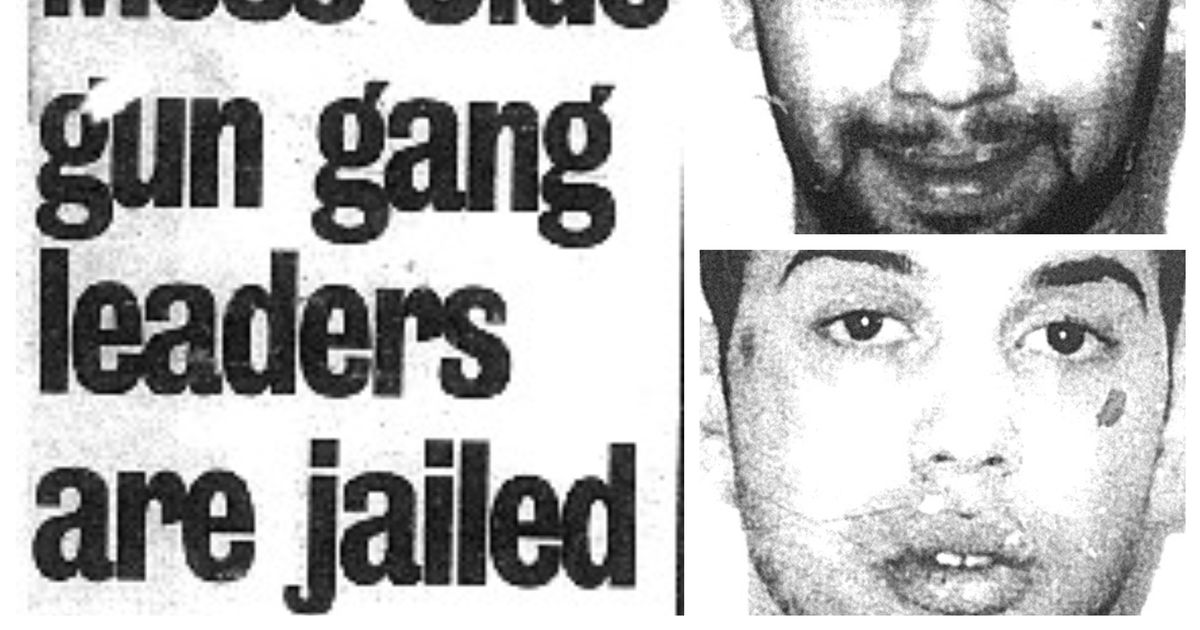Before they rose to become south Manchester’s most-feared gangsters the Gooch Gang head honchos were brought down by an anonymous police tip-off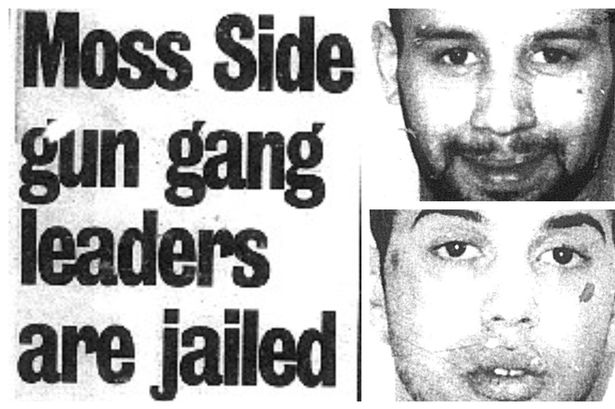 How the M.E.N. reported the 2001 jailing of Gooch Gang leaders Lee Amos (top right) and Colin Joyce
How the M.E.N. reported the 2001 jailing of Gooch Gang leaders Lee Amos (top right) and Colin Joyce
The anonymous tip came in at 1.50pm on Thursday, April 20, 2000.
“Lee Amos is keeping someone hostage,” said the female voice at the end of the line before giving police an address on Ruskin Avenue, Moss Side. Alongside his childhood friend and right-hand man Colin ‘Piggy Joyce’, Amos – AKA ‘Cabbo’ – was then a leading member of the Young Gooch Crew, an offshoot of the Gooch Gang, one of south Manchester’s most-feared street gangs.
The terraced house, not far from Manchester City’s old Maine Road home, was also a known Gooch address. For the detectives who had been keeping tabs on the gang for months it had the potential to be a major breakthrough in their fight against organised crime.
The turn of the century was among the most bloody and violent periods of Manchester’s notorious gang wars. In 1999 there were 81 shootings and eight murders in south Manchester alone.
Gooch, the largest of south Manchester’s four main street gangs, had been fighting on two fronts simultaneously. On one flank they were up against their long-term rivals Doddington, based, like them, in Moss Side, while on the other they were facing off against the younger Longsight Crew.
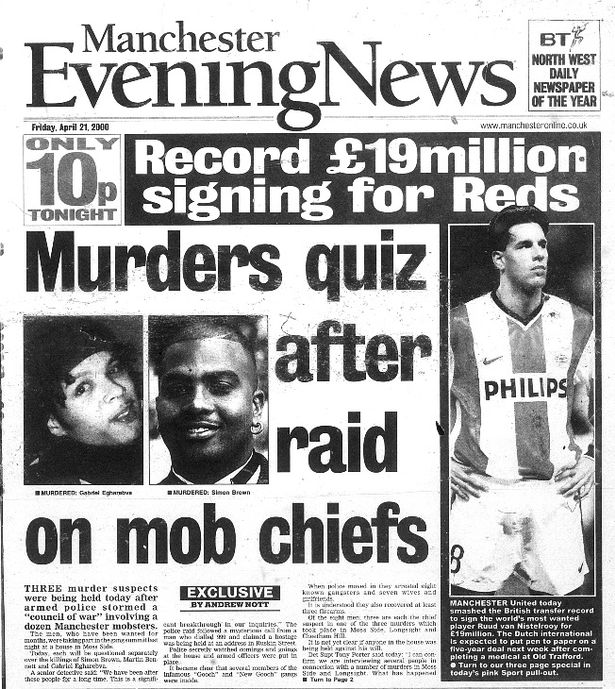 How the M.E.N. reported the Ruskin Avenue raid
How the M.E.N. reported the Ruskin Avenue raid
But things came to a head with the murder of a young father-of-two named Martin Bennett. The 25-year-old, who was nicknamed ‘Remy’ for his fondness for Remy Martin brandy, had been tiring of gang life and had confided in friends that he was looking for a way out.
Tragically he never got his wish. On July 31, 1999, Bennett was among a group of young men who were involved in what police later described as ‘a minor fracas’ outside a Moss Side newsagents.
Shortly afterwards, while walking down Great Western Street, he was blasted in the chest by two gunmen thought to have been loosely affiliated with Doddington. Word of the killing soon got out. By dawn there had been six more shootings as Doddington’s leaders, enraged that they were being blamed, decided to get their retaliation in first.
Join our Court and Crime WhatsApp group HERE
But the Gooch also hit back quickly. Four days after Martin Bennett’s death a 20-year-old man called Dorrie McKie was shot dead in Hulme. Then, on August 15, 24-year-old Anthony Cook, who police later briefed had links to Doddington, was shot seven times in the head and body in a ‘premeditated murder’ that followed a dramatic car chase through south Manchester.
Speaking at Martin Bennett’s funeral Moss Side priest and community campaigner Fr Phil Sumner called for the bloodshed to stop. “I’m aware there will be people in church who can re-instigate a truce and I would appeal for them to do so,” he said.
“I ask people where the killings get them? What happens to the families and the children of the victims?
“The credible message on the street is that Martin and Antony’s deaths are gang-related but not necessarily tit-for-tat shootings. What I do know also is that the community has the power to stop this process here and now, to say enough is enough before it spirals down again further.”
But the priest’s appeals fell on deaf ears. Over the following months the bad blood continued to simmer and the tit-for-tat reprisals continued, until, five hours after the anonymous tip-off on April 20, armed police raided the Ruskin Avenue address.
There was no hostage inside. Instead police found seven men, six women and a formidable arsenal of weapons.
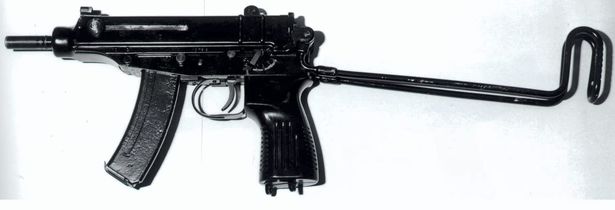 The Skorpion machine gun found during the raid on Ruskin Avenue
The Skorpion machine gun found during the raid on Ruskin Avenue
The firearms included a Skorpion machine gun capable of firing 1,000 rounds a minute, a loaded Smith and Wesson .38 revolver and a Colt .45 with one bullet in the chamber. Alongside the guns five pieces of body armour, one of which was Greater Manchester Police issue, two scanners tuned to a police frequency and a pair of night vision binoculars were also recovered.
When they were arrested Amos, who died in prison in April last year aged 48, was wearing body armour, while Joyce was wearing jeans that had been adapted to conceal guns and ammo in the pockets.
Never miss a story with the MEN’s daily Catch Up newsletter – get it in your inbox by signing up here
Those present claimed they were attending a birthday party. But police were confident they had in fact interrupted what the Manchester Evening News later described as a ‘council of war’ planning the gang’s revenge for the murder of Martin Bennett.
‘Murders quiz after raid on mob chiefs’ ran the headline on the following day’s M.E.N. “We have been after these people for a long time. This is a significant breakthrough in our enquiries,” an unnamed senior detective told the paper.
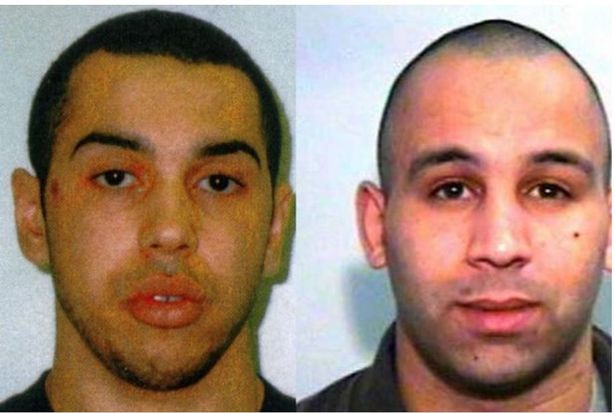 Colin Joyce (left) and Lee Amos pictured after being jailed for life in 2009
Colin Joyce (left) and Lee Amos pictured after being jailed for life in 2009
Amos and Joyce would later go on to take control of the Gooch, becoming two of the men who turned Manchester into ‘Gunchester’, before, in 2009, they were jailed for life for murder.
But the 2001 arrests would mark the first serious blow to their criminal ambitions. At the time Amos, 25, and Joyce, 21, had built a reputation as two of Gooch’s most reliable soldiers and were quickly working their way up the gang’s hierarchy.
Charismatic and ruthless, the childhood friends had risen from teenage tearaways to feared gangland enforcers. They had been linked to several shootings and their names had come up in a number of murder inquiries. But they had always managed to stay one step ahead of the law.
That changed following the raid on Ruskin Avenue. On June 15 the following year, Amos, Joyce and two other men pleaded guilty to possession of firearms with intent to endanger life and possession of ammunition.
Sentencing each to nine years in prison at Manchester Crown Court Judge Michael Henshell said: “It is clear that during the 1990s, and increasing day-by-day until the present, there has been a steady and terrifying increase in the carrying of guns in the city.
“Lives, young lives, are tragically being cut short in large areas of the city and a similar handful of people believe they are outside the law.”
It was a major victory for GMP. They had dealt a significant blow to the Gooch Gang and taken two of south Manchester’s most dangerous men off the streets.
And, with south Manchester’s other gangs in disarray or also facing jail-time, it offered hope of a ceasefire in the city’s gang wars. But, as the following years proved, it would prove to be only a temporary respite.
